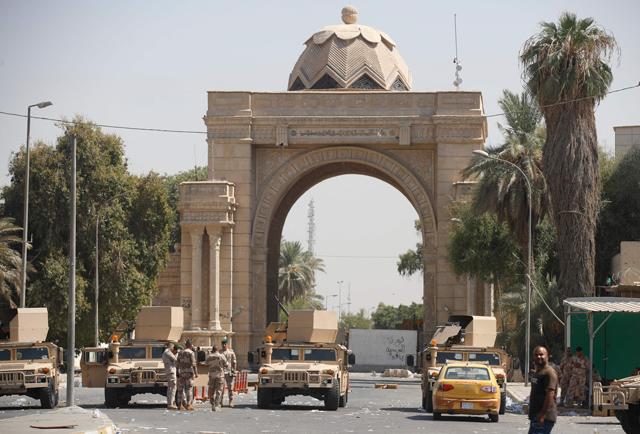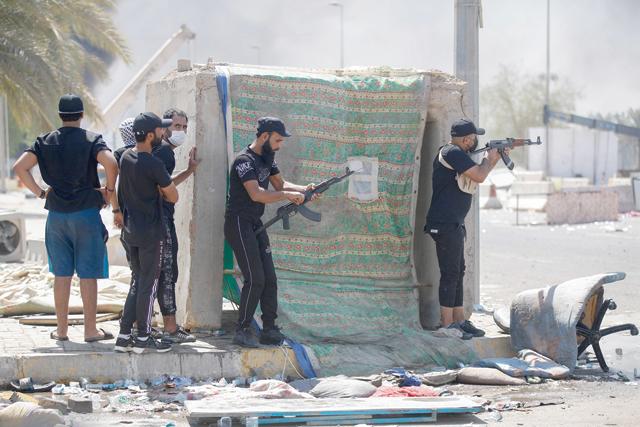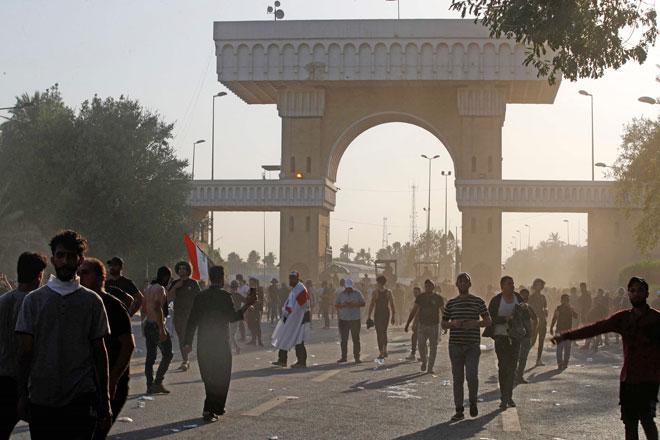You are here
Iraq political gridlock persists after bloody unrest
By AFP - Aug 31,2022 - Last updated at Aug 31,2022

Iraqi forces stand guard as supporters and members of Saraya Al Salam (Peace Brigade), the military wing affiliated with Shiite cleric Moqtada Al Sadr, withdraw from Baghdad's Green Zone on Tuesday (AFP photo)
BAGHDAD — A months-long political crisis in Iraq showed little sign of abating Wednesday despite a fresh push for negotiations after nearly 24 hours of deadly violence between rival Shiite factions ended.
Baghdad's highly-secured Green Zone returned to normality after 30 people were killed and 570 wounded in the clashes pitting supporters of powerful Shiite cleric Moqtada Sadr against pro-Iran factions.
Since elections in October 2021, political deadlock has left Iraq without a new government, prime minister or president, due to disagreement over the formation of a coalition.
The tensions escalated sharply on Monday when Sadr loyalists stormed the government palace inside the Green Zone following their leader's announcement that he was quitting politics.
But Sadr's supporters trickled out of the Green Zone in a steady stream on Tuesday afternoon when he appealed for them to withdraw within the hour.
A nationwide curfew was lifted, before shops reopened and infamous traffic jams returned to Baghdad’s streets on Wednesday as the government announced the resumption of school exams postponed by the unrest.
But the hurdles obstructing a solution to Iraq’s political crisis remained firmly in place, with rival powers refusing to budge on their demands.
Early elections, less than a year after the last polls, and the dissolution of parliament have been a key demand of Sadr.
Iraqi President Barham Saleh said late Tuesday that snap elections could provide “an exit from the stifling crisis”.
Under the constitution, parliament can only be dissolved by a majority vote, which can take place at the request of a third of lawmakers, or by the prime minster in agreement with the president.
Sadr’s rivals in the pro-Iran Coordination Framework want a new head of government to be appointed before any new elections are held.
On Tuesday, they called for the swift formation of a new government, “to prevent a recurrence of the strife” that paralysed Baghdad this week.
The Framework urged parliament and other state institutions to “return to exercising their constitutional functions and carry out their duties towards citizens”.
The statement drew the ire of a senior aid of Sadr, Saleh Mohammad Al Iraqi, who said it overlooked the rightful demands of protesters killed in the Green Zone who want parliament dissolved.
“Iran should reign in its Iraqi camels, or else there will be little room left for regret,” he said Wednesday, referring to the Coordination Framework.
Prime Minister Mustafa Al Kadhemi, meanwhile, threatened to resign unless the paralysis ends.
“If they want to continue to stir up chaos, conflict, discord and rivalry... I will take the moral and patriotic step and vacate my post,” he said.
‘More protests’
Iraqi political analyst Sajad Jiyad said a return to violence was possible in the absence of a longer term solution.
“The biggest loser is the state, standing idly by while two powerful armed parties continue to struggle for control,” he said.
“Unless a proper solution is reached, more protests and violence are possible.”
Falah Al Barzanji, a 63-year-old activist, said he believed the calm would be short-lived.
“Today life has returned to normal, but the fire is still burning under the ashes,” he told AFP.
“The Iraqi parliament must be dissolved and a reformist government must be installed.”
Pope Francis, who visited Iraq last year, said he was “following with concern the violent events that have taken place in Baghdad”.
“Dialogue and fraternity are the best way to face the current difficulties.”
Sadr, a longtime player in the war-torn country’s political scene, though he himself has never directly been in government, announced he was quitting politics two days after he said “all parties” including his own should give up government positions to help overcome the deadlock.
Sadr’s bloc emerged from the October election as the biggest in the legislature, with 73 seats, but short of a majority.
Since then Iraq has been paralysed due to disagreement between Shiite factions over forming a coalition.
In June, Sadr’s lawmakers quit in a bid to break the logjam, which led to the Coordination Framework becoming the largest.
Sadr’s supporters had for weeks been staging a sit-in outside Iraq’s parliament, after storming the legislature’s interior on July 30, demanding fresh elections be held.
Related Articles
BAGHDAD — Iraq's judiciary said on Sunday it lacks the authority to dissolve parliament as demanded by populist Shiite Muslim cleric M
BAGHDAD — Iraqi supporters of powerful cleric Moqtada Sadr began withdrawing Tuesday from Baghdad's Green Zone after he demanded fighting en
BAGHDAD — Eight protesters were killed and Iraq declared a nationwide curfew after supporters of Moqtada Sadr stormed the government palace













